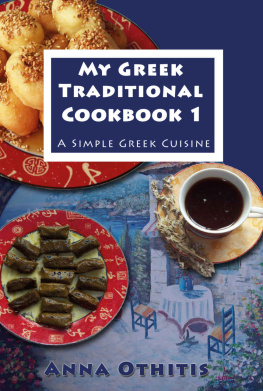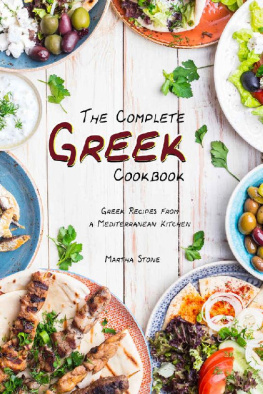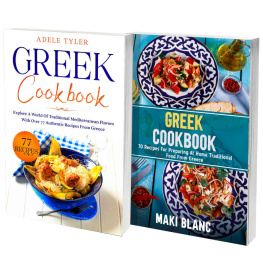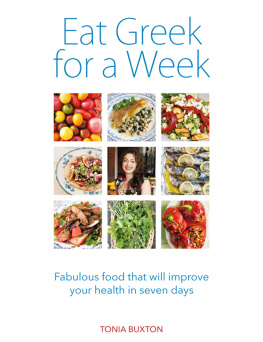My First Greek
Traditional Cookbook
Simple Greek Cuisine
Original Favorites with Authentic Flavors
Snacks, Dips, Meals, Sweets
By Anna Othitis
My First Greek Traditional Cookbook
Copyright 2014 by Anna Othitis.
All rights reserved.
No part of this publication may be reproduced, stored in a retrieval system or transmitted in anyway by any means, electronic, mechanical, photocopy, and recording. With intend only to be used for personal reasons. Not to be amended, distributed, sell, quote, use any part of the
content within this book without the prior permission of the author except as provided by the USA copyright law.
Published by LionheART Publishing House
Greek, Food, Healthy, Salads, Natural Foods, Nutrition, Baking
Dedicated to my amazing Greek mother, Chrisoula Galanakis and late mother in law Franga Othitis great cooks and teachers by whom I was taught to cook and bake.
And
To my husband and three children for whom I cooked and still cook for who have made this recipe book possible with their great encouragement and trust in me.
CONTENTS
Living and growing up in Zimbabwe, Africa most of our lives we had the opportunity to always grow our own vegetables in our natural environment and surroundings. Everything we ate was authentic and naturally grown on our rich land. I highly recommend and suggest that the more natural and home grown the ingredients the more HEALTHY and NUTRITIONAL they will be for our HEART, BODY and MIND
Greeks love to celebrate life with an abundance of good healthy food, dance, music, wine and song. Modern research has proved that the traditional Greek cuisine is the heart-healthiest food in the world. Studies indicate the rural people of Greece and islands such as Crete and Karpathos have some of the world's lowest rates of diet-linked disease and obesity, and are among ethnic groups with the longest life expectancies. Growing up Greek in Zimbabwe, Africa with a big Greek family we enjoyed my grandmothers and mothers great healthy cooking and brought up my own family with daily Greek healthy eating. We always attended many birthdays, weddings, bridal showers, baptisms, name day celebrations (Saint's day), religious holidays, Christmas and Easter. There were our yearly Greek celebrations, parades, the annual glendia (festivals) of our fellow countrymen from around Greece, mostly Crete and the Karpathos Islands, where we inherited our family's Greek roots and traditions. With our Big Fat Greek Family of aunts, uncles, cousins, nieces, nephews, godparents and relatives through marriage , enjoying the Greek heart-healthy delicious home-cooked meals and celebrations seated around huge tables talking, laughing and celebrating with adults and children joining in: precious family times.
Greece has given the world much, from sports, architecture to philosophy. One of Greece's most valuable contributions is its authentic healthy cuisine.
At the core of the traditional Greek diet are the naturally homegrown dark-green leafy vegetables often gathered from the fields and mountains, including dandelions, spinach, mustard, fennel, cumin, fresh fruits such as figs, pears, plums, grapes, melons and oranges all handpicked from the homelands. Our foods are high in fiber such as whole grains, beans and lentils, carbohydrate-rich pastas and breads, natural rich extra virgin olive oil, olives, nuts, many herbs and spices such as garlic, oregano, bay leaves, cinnamon and cloves. There is scientific proof that delicious natural Greek Mountain Tea and herbschamomile, anise, mint, strawberries, honey and royal jelly are used for medicinal purposes and help in the prevention of cancer, especially breast cancer and osteoporosis.
Rich in immune-boosting antioxidants, the Greek diet provides cancer-fighting compounds, healthful omega-3 fatty acids and colon-cleansing fiber, which all help lower the risks of diet-linked diseases, including heart disease, obesity and diabetes.
*
A 2003 study conducted jointly by University researchers in Athens, Greece and Harvard University found that people who consumed a traditional Greek diet with products derived from the natural environment experienced a 33 percent lower risk of death from heart disease and a 24 percent lower risk of death from cancer.
Many Greek dishes are made with cheeses that are lower in fat and easier to digest than those made from cow's milk. Feta made from goat's or sheep's milk is more natural. The Greeks enjoy creamy goat-milk thick yogurt with fresh fruit with natural honey.
Greek cuisine is noted for its use of olive oil used abundantly in lamb dishes which are traditionally eaten on special occasions. Greek meals include fresh sea fish - anchovies, cod, flounder and tuna in moderate portions. Proved in several studies, the omega-3 fatty acids in fish oils help prevent heart attacks and high blood pressure.
The Mediterranean diet is characterized by a high consumption of fruit, vegetables, legumes, and non-refined cereals, a frequent consumption of fish, a moderate intake of alcohol, mainly wine during meals, a moderate consumption of milk and dairy products, mostly in the form of cheese and yogurt, and a low intake of meat and meat products. The Mediterranean diet is rich in monounsaturated fatty acids due to the liberal use of extra virgin olive oil. It is also characterized by high content of fiber, vitamins, minerals and natural antioxidants, while the content of polyunsaturated, saturated, and hydrogenated lipids is low. (Antioxidant Properties of Greek Foods and the Flavonoid Content of the Mediterranean Menu).
There are essential features of life in the Mediterranean that have spotlighted its cuisine as a tradition, that being the Greek appealing enjoyment of everyday life. Still kept and practiced, more so on the islands. The simplest of pleasures amongst the nation is the appreciation of healthy food relating to prolonged good health and life.
Greek mountain tea is also popular in the Mediterranean region and used as a tonic for a variety of health complaints, from colds to upset stomachs. The Sideritis family of tea plants from which the tea is made has been studied in the lab to investigate potential health benefits particularly due to antioxidant properties in the tea and the teas ability to treat ulcers. Studies have shown that a solution of 4 percent Greek mountain tea increased the total antioxidant power of the midbrain in mice.

Many refer to the Mediterranean Diet as the foods of the Land and Sea because of the ingredients that make up the method are derivatives of either or both. Foods that are from its natural source with its pure nutritional benefits.

The Mediterranean diet is not only about what you eat. Its a way of life.
We hope you truly enjoy making and eating our delicious family recipes as much as we have enjoyed them and still do to this date. Using the most natural authentic organic ingredients without preservatives is the secret and key factor to healthy eating and success to our Greek cuisine
1. Avgolemono Soup
(Chicken Lemon Egg Soup)
This is a very popular traditional tasty and healthy Greek soup served and found on all menus in all Greek restaurants worldwide. This soup is made at most Greek holiday festivities.











